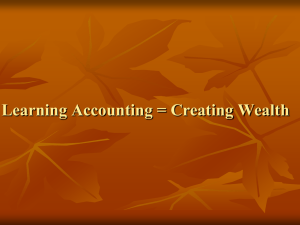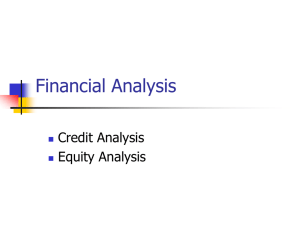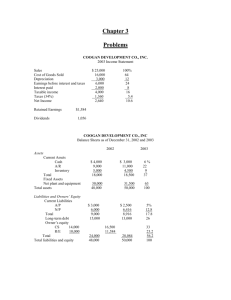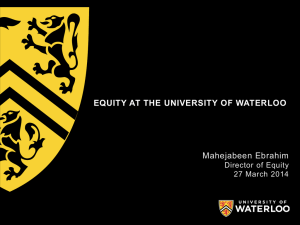free sample here
advertisement
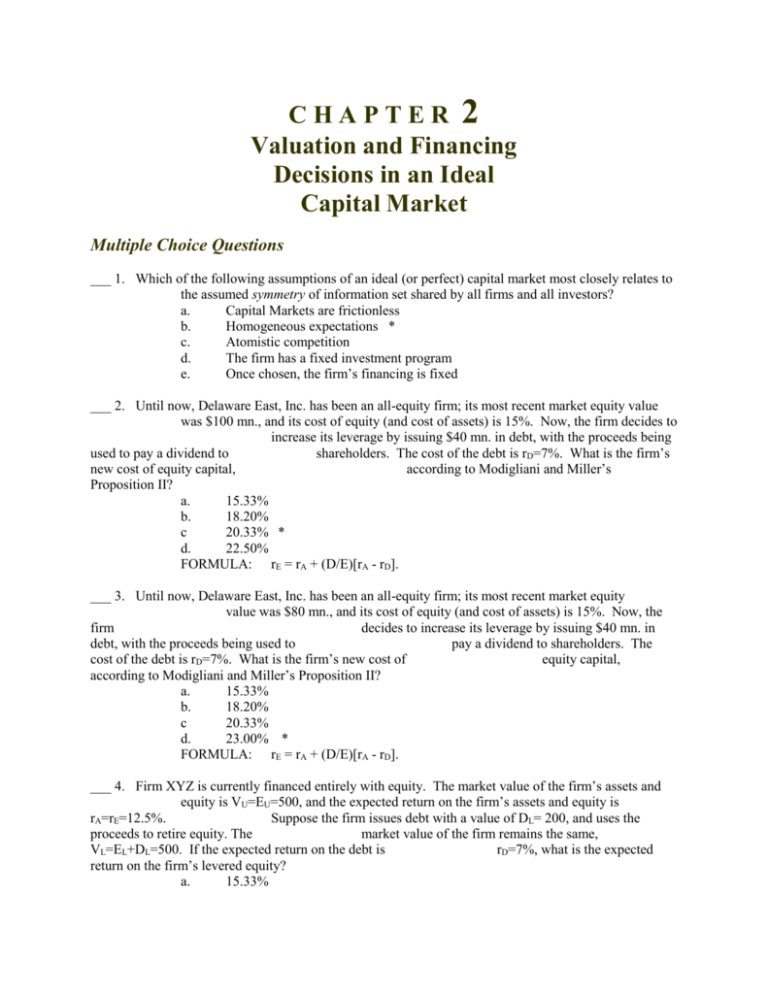
CHAPTER 2 Valuation and Financing Decisions in an Ideal Capital Market Multiple Choice Questions ___ 1. Which of the following assumptions of an ideal (or perfect) capital market most closely relates to the assumed symmetry of information set shared by all firms and all investors? a. Capital Markets are frictionless b. Homogeneous expectations * c. Atomistic competition d. The firm has a fixed investment program e. Once chosen, the firm’s financing is fixed ___ 2. Until now, Delaware East, Inc. has been an all-equity firm; its most recent market equity value was $100 mn., and its cost of equity (and cost of assets) is 15%. Now, the firm decides to increase its leverage by issuing $40 mn. in debt, with the proceeds being used to pay a dividend to shareholders. The cost of the debt is rD=7%. What is the firm’s new cost of equity capital, according to Modigliani and Miller’s Proposition II? a. 15.33% b. 18.20% c 20.33% * d. 22.50% FORMULA: rE = rA + (D/E)[rA - rD]. ___ 3. Until now, Delaware East, Inc. has been an all-equity firm; its most recent market equity value was $80 mn., and its cost of equity (and cost of assets) is 15%. Now, the firm decides to increase its leverage by issuing $40 mn. in debt, with the proceeds being used to pay a dividend to shareholders. The cost of the debt is rD=7%. What is the firm’s new cost of equity capital, according to Modigliani and Miller’s Proposition II? a. 15.33% b. 18.20% c 20.33% d. 23.00% * FORMULA: rE = rA + (D/E)[rA - rD]. ___ 4. Firm XYZ is currently financed entirely with equity. The market value of the firm’s assets and equity is VU=EU=500, and the expected return on the firm’s assets and equity is rA=rE=12.5%. Suppose the firm issues debt with a value of DL= 200, and uses the proceeds to retire equity. The market value of the firm remains the same, VL=EL+DL=500. If the expected return on the debt is rD=7%, what is the expected return on the firm’s levered equity? a. 15.33% b. 18.20% c 20.33% d. 23.00% * FORMULA: rE = rA + (D/EL)(rA - rD) ___ 5. For the equity of Delaware East, =1.25. If the expected return on the market is 15% and the risk-free rate is 5%, what is the expected return on the firm’s equity? a. 12.50% b. 15.00% c. 17.50% * d. 18.75% FORMULA: ri = rf + i[rm-rf] ___ 6. The market value of Delaware East’s assets is $100 mn. The firm has one issue of pure-discount debt outstanding which promises to pay $60 mn. in 5 years. If the standard deviation of the firm’s assets is 22% and the risk-free rate is 5%, what are the values of the firm’s equity and debt, based on the Black-Scholes model? value of equity value of debt a. $54 mn. $46 mn. * b. $46 mn. $54 mn. c. $38 mn. $62 mn. d. $30 mn. $70 mn. FORMULA: C=V*N(d) - e rf T X*N(d-T), where d= ln( V / X ) [rf ( 2 / 2)]T T (Also need Cum. Normal Distr. Fn. table) ___ 7. Suppose you develop a mutual fund that includes 500 NYSE stocks, all with equal weights in the fund’s portfolio. The average standard deviation of the stocks is 36%, and the average pair-wise correlation among the stocks is 0.40. What is your estimate of the standard deviation of the fund’s portfolio? a. 19.9% b. 22.8% * c. 26.2% d. 32.1% 1 1 FORMULA: p [ * ( 2 ) (1 ) * ( 2 )]1 / 2 N N ___ 8. Suppose you develop a mutual fund that includes 78 stocks, all with equal weights in the fund’s portfolio. The average standard deviation of the stocks is 44%, and the average pair-wise correlation among the stocks is 0.30. What is your estimate of the standard deviation of the fund’s portfolio? a. 19.5% b. 24.5% * c. 29.5% d. 34.5% 1 1 FORMULA: p [ * ( 2 ) (1 ) * ( 2 )]1 / 2 N N ___ 9. Using the Binomial Model, find the value of a firm’s levered equity (EL) given the following values: V=100, u=1.3, d=1/u, p=0.7, rf=5%, X=100, and T=3. EL a. 32.34 b. 27.34 c. 23.96 d. 18.96 * FORMULAS: V1u V1d E uL1 E dL1 1 1 ; EL = V[ ] V1u E uL1 /(1 rf ) T ; u d E uLT max( 0, VLT X); E dLT max( 0, VLT X) ___ 10. Using the Binomial Model, find the values of a firm’s levered equity (EL), and the expected return on the equity, rLE, given the following values: V=100, u=1.3, d=1/u, p=0.7, rf=5%, X=100, and T=3. EL rLE a. 32.34 6.92% b. 32.34 10.74% c. 18.96 6.92% d. 18.96 10.74% * FORMULAS: V1u V1d E uL1 E dL1 1 1 ; EL = V[ ] V1u E uL1 /(1 rf ) T ; u d E uLT max( 0, VLT X); E dLT max( 0, VLT X) ; rLE E Tu E L E dT E L p (1 p) EL EL ___ 11. The expected returns on the debt and equity of a levered firm are rE=15% and rD=7%, and the current market value of the debt and equity are E=66 and D=44, respectively. What is the firm’s weighted average cost of capital (WACC)? a. 7.8% b. 9.8% c. 11.8% * d. 13.8% FORMULA: WACC=rD(D/V)+rLE(E/V) ___ 12. The expected returns and standard deviations for stocks A and B are rA=14% and rB=19%, respectively, and A=23% and B=34%, respectively. The correlation of the returns on the two stocks is AB=0.3. What is the expected return, rP, and standard deviation, P, of a portfolio with weights of wA=0.60 and wB=0.40 in stocks A and B, respectively? rP P a. 16% 22.1% * b. 16% 24.8% c. 17% 22.1% d. 17% 24.8% FORMULAS: rp = wArA + wB rB; p= [ w 2A2A w 2B2B 2w A w BABAB ]1/2 ___ 13. For your retirement fund, you have decided to place 40% of your contributions into a riskfree asset that pays 4% interest per annum, and the remaining 60% of your contributions will be placed in an available stock mutual fund that approximates the holdings of the mythical market portfolio. You expect this fund to provide an average return of rP=9%, but will expose you to risk, measured in terms of an estimated standard deviation of P=20%. What is your estimate of the expected return and standard deviation of your complete portfolio, rC and C, respectively? rP P a. 6% 5.9% b. 6% 20.0% c. 7% 12.0% * d. 7% 20.0% FORMULAS: rc = wfrf + wprp; c = wpp = .6(20%)=12% ___ 14. Suppose the beta of the stock of Microsoft, Inc. is msft=1.45. If rf=4% and rM=9%, what is the equilibrium expected return on Microsoft stock, rmsft, according to the CAPM? As an analyst of the firms in the high-technology industry, you expect Microsoft to provide a return of 10% over the next year. Comparing your estimate with equilibrium expected return on Microsoft that you just calculated, would you recommend to your investors that they buy Microsoft stock? a. Yes: Microsoft is underpriced b. No: Microsoft is overpriced * FORMULA: rf + i[rM-rf] Essay Questions Firm XYZ is currently a privately held, all-equity firm. The firm’s shareholders are about to sell all of the firm’s shares to the pubic in an initial public offering (IPO). Assuming that an optimal capital structure that involves a finite proportion of debt exists for firm XYZ, present an argument that, even though the current shareholders will present an allequity firm to the public, the proceeds that the current shareholders will receive will be equal to the value of the firm at its optimal capital structure. 1. 2. Suppose a firm is financed entirely with equity, and the current market value of its assets and equity is VU=EU=100. As an arbitrageur, you know that if the firm was capitalized with 50% equity and 50% debt, the market values of the debt and equity of this levered version of the firm would be EL=60 and DL=50, respectively. What would you do? ANSWER: Purchase the fraction of the equity of the unlevered firm at a cost of 100. Place these shares in a trust, and issue debt with a value of DL=50 that is a claim against the shares in the trust, keeping the proceeds of this debt offering. Then sell this ‘levered’ trust for a price of EL=60. Your profit will be (50+60-100)=10. 3. Suppose a firm is financed with 50% equity and 50% debt, and the current market value of the firm is VL=100, with EL=50 and DL=50. As an arbitrageur, you know that if the firm was financed entirely with equity, the market value of its assets and equity would be VU=EU=125. What would you do? ANSWER: Purchase the fraction of both the equity and debt of this levered firm at a total cost of EL+DL=100, place these securities in a trust, and sell unlevered equity securities against this trust, which would yield proceeds of 125. Thus, your profit will be (125-100).
